When a cat climbs on your lap or lies down next to you, it shows its affection and affection this way. When a domestic cat sleeps in its owner's bed, it uses it as a warm place with a familiar scent. He feels more at ease when he feels the proximity of his owner, and the cat is confident that he is in control of the person this way. Another theory is that a cat sleeps on a person or their belongings in order to absorb negative energy and relieve their pain. This animal senses vulnerable places and lies down on the part of the body where pain and fever are high.
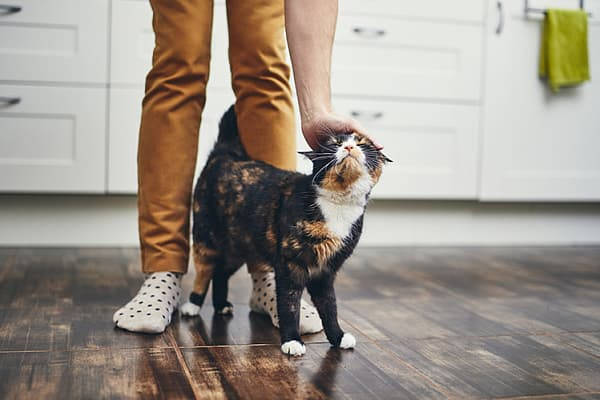
- Reasons why a cat rubs itself against a person's legs
- A cat's purr can tell you a lot about its mood and desires
- Therapeutic animals
- Why do cats rub people's feet? A veterinarian's opinion
- Why a cat sleeps on a person: what its postures and chosen place mean
- Walking
- How to wean a cat from rubbing its legs
- Why do cats like to rub their feet?
- Why do cats rub people's feet and furniture?
- A version from folk healers
- "Endorphin addicts".
Reasons why a cat rubs itself against a person's legs
As already mentioned, cats try to "mark" their territory and the people living on it. They are like owners: they "mark" the owner with their smell and scare other cats away from him. To do this, they rub their owner's legs and put special pheromones on them.
Cats often consider their owners as members of their family (personal world). When they rub their owners' feet, they often want to say something.
- They need affection (for example, when a cat rubs its feet and purrs, it shows its love for its owner);
- the animal wants to attract the attention of its owner (for example, if the person has been away for a long time, the cat has experienced stress from the separation and therefore wants to remind the person that it is time to feed);
- the cat rubs because of territorial reasons (it marks its territory, like dogs, to show dominance);
- Cats rub their owners before the heat (if a cat has been very restless lately and is constantly asking for attention, it may be that she is going to be in heat. But cats should not suppress heat on their own, it is better to consult a doctor).
You should not teach your cat to rub its feet or forbid it to do so.
Otherwise, the animal can experience a lot of stress. After all, the "marking" of the territory plays an extremely important role in its life. In addition, it is possible that the cat simply lacks attention and affection. When a person treats his pet well enough, he rarely feels the need to annoyingly rub his feet.
A cat's purr can tell you a lot about its mood and desires
Scientists have not yet found out how cats purr and what they feel when they do that. According to some theories, cats purr because of electrical impulses that cause the muscles near the vocal cords to contract. A cat purrs with its mouth and nose at the same time, and the vibration of this sound is transmitted throughout the body.
Most often, cats purr when they need something from a person (to get food or affection). However, it is not uncommon for animals to purr because they are lonely and in pain. They try to soothe themselves by purring.
If the purr is loud, the cat is happy and grateful to humans for their attention. If its purr is soft and quiet, the cat is probably falling asleep. If a cat purrs softly but loudly, it indicates that it needs something (most often it is with these sounds that the animal meets its master at home).
Therapeutic animals
Many believe in the healing properties of cats, and this theory has many fans. Not without reason in Western countries are often used for therapeutic purposes "animal therapy" and "pet therapy" – methods of treatment with animals. Along with dogs, dolphins, horses, rodents and birds in this process successfully participate and cats:
- Communicating with furry "healers" distracts from prolonged therapy and improves emotional well-being.
- Animals contribute to the socialization of people with intellectual disabilities.
- It is proven that sessions during which the person is with the pet provide the same results as taking nootropic drugs and antidepressants.
So if a furry pet wants to socialize, do not ignore him, perhaps he is trying to help and relieve suffering.
Cats are quite popular pets that can brighten up the loneliness of the owner. They often enter the house uninvited and in doing so become real family members. And while many people are not interested in why pets rub their feet, it is important to respond to this behavior in the right way.
Why do cats rub people's feet? A veterinarian's opinion
Veterinarian B. Galkin told the publication Newsthat when the cat rubs the legs of the owner, it expresses trust and love, and also "marks" it. As noted by the expert, the smell is the responsibility of special glands of the cat, which are located near the sweat and sebaceous glands.
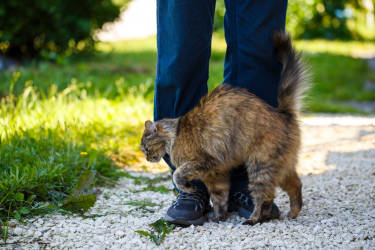
As it rubs its owner's legs, the cat marks him with its own pheromones, showing its trust and love. Also, this way the animal attracts attention to itself and shows that it is bored and wants affection.
Cats are great manipulators, but they can not be hypocrites, and they will show their discontent immediately, if they do not like anything. For example, the four-legged animals are able to refuse food for several days, if they want something tastier.
Recently, veterinarian L. Korocheva told radio Sputnik , for what reason cats begin to eat houseplants. Usually it is caused by the animals' need for vitamins and fiber. This happens if the basis of the cat's diet is dry food.
According to recent studies, the number of dead birds and bats during migration increases because of wind turbines.
Whale watchers in California recently witnessed a rare sighting of a white calf among a flock of killer whales, also known as Orcinus orca.
Why a cat sleeps on a person: what its postures and chosen place mean
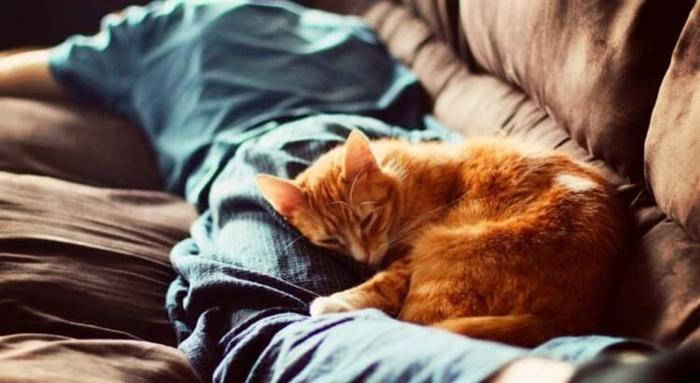
When a cat climbs on his lap or lies down next to him, he thus shows his disposition and affection. When a domestic cat sleeps in its owner's bed it uses it as a warm place with a familiar scent. He feels more at ease when he feels the proximity of his owner, and at the same time, the cat is sure that this way he controls the person. Another theory is that a cat sleeps on a person or their belongings in order to absorb negative energy and relieve their pain. This animal senses vulnerable places and lies down on the part of the body where there is pain and fever.
It is important for cats to participate in their owner's life and be a part of the events that occur. When they lie down on a person, their clothes, or jump into their arms, they feel in the thick of things, and with their sense of smell they receive additional information.
When a cat rubs itself against a person and their belongings, it leaves its scent behind and accepts it as a member of its pack. Especially if the kitten was weaned early, this is how it perceives the person. The cat worries about him, and if he feels something wrong in his body, he will lie down on his weak spot and share his healing energy.
For reasons unknown to man, the cat likes to fall asleep not in the cat's house, but in a human bed or in an armchair. Pregnant women most often experience discomfort when an animal sits on their belly. They worry that the pet will harm the pressure of its weight on the forming fetus. And some are afraid that the cat feels some kind of abnormality. In fact, the animal is simply leaning against a warm and lively place.
If a kitten is used to sleeping in the owner's bed, this behavior becomes a bad habit for a house cat. It is difficult to wean it from climbing into a person's bed, even though it stopped shivering and freezing long ago. Having become an adult and independent (in his opinion), the cat still feels vulnerable during sleep. And since he sleeps most of his life, the smell of his owner is soothing and gives him a sense of security. The man is many times larger than his pet, and the animal feels confident and invulnerable under his protection.
Walking
Rubbing its feet can be more than just a way of expressing pleasure or marking territory. There are situations when a cat rubs its legs, carpets, other objects in the room or horizontal surfaces, meows strongly or raises its back part of the body. All these actions are usually performed when the cat is on the run.
On the physiological level, these manifestations are related to the sexual receptivity of the animal, when the nerve endings become more sensitive. This period does not last very long, but it can occur several times a year.
How to wean a cat from rubbing its legs
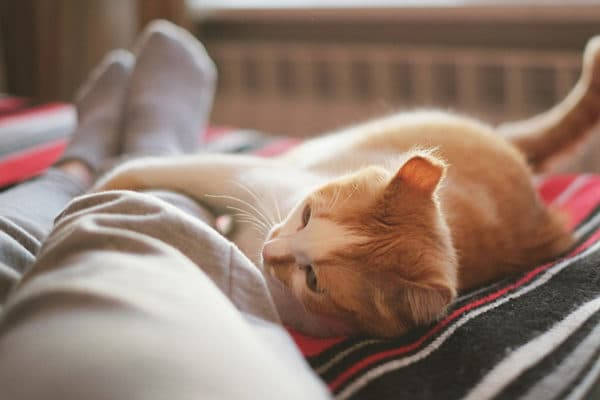
If the cat rubs its feet or various objects in the room, it should not cause much discomfort. Usually these actions are not very often manifested by animals, and as mentioned above, in this way they mark their territory and establish a connection with the outside world.
However, sometimes the owner may not like this behavior, when he is not ready to share his personal space with a whiskered family member. If the owner is not ready to sleep in the same bed with him, treat him with treats from his plate, constantly pet and caress him, it is better not to encourage rubbing his feet from the beginning:
If the above recommendations are followed regularly, soon the whiskered pet will stop rubbing its owner's feet.
Why do cats like to rub their feet?
1.Cats have glands around their whiskers that secrete an enzyme, an odorous substance. We can't smell it. But cats are good at sensing it. They rub on objects as well. On walks they rub against corners of houses and so on. This way they orient themselves in space.
2. When they rub their owners' feet, they also mark and then recognize their owner in a crowd.
They rub their master's legs because they feel his trust in them. Thus, in a critical situation, when it feels its scent on a human, it seeks protection from him. A cat will never get close to a person who has ever hurt her in a dangerous situation.
If a cat rubs its head (or its croup) against other cats, people or objects, it means it wants to leave its scent on them. There are pheromone glands on the lips, chin, and the front, less overgrown area. The cat uses them to make personal marks on objects, letting everyone else know that "This is mine" or "I live here. When he rubs his head in a figure-of-eight pattern around your feet, it's the same, but a stronger feeling joined by a request. The cat reminds you that it wants something, most often food. If the cat pats (beats his forehead against another cat's forehead or an accessible part of the human body) It means it shows intimate affection that not everyone deserves.
RAKE*** Genius (74062) Unfortunately the answer itself is not mine. Although there are a lot of spelling mistakes – I did not correct them, and indicated where the source of information was taken.
Hello all. I do not understand his cat. in the morning he stares at me. when he wants to eat? kicking. and when he wants to play, he begins to bite and scratch.
They're marking you. Cats have glands near their ears. We don't feel these tags, but cats do. So they "score" their owners.
They're the ones who say, "You're in charge," "You're my mistress."
In general, they respect. Usually they do this when they want something from you, and we just melt in a smile and submit to these little furry tyrants).
Why do cats rub people's feet and furniture?
Why does a cat like to rub itself against people and objects?
This is how a cat tags objects in its territory. This allows it to recognize them later on and feel secure in familiar surroundings. For marking, the cat uses special temporal glands on both sides of the forehead between the ears and the eyes. Similar organs also exist around the lips, more precisely, near their corners (perioral glands) . They secrete secretions that the cat leaves on doors, stair railings and furniture legs when it rubs its head against them, such glands also exist on the tail: they secrete the same secret that the cat applies when it lifts its tail with a pipe and moves it on the chosen object. The glands can also be found around the anus and probably on the paw pads. When showing its favor to a human, the cat leaves its mark on the human by rubbing its face and tail against it, often while purring loudly. This behavior is one of the signs of affection that kittens show to their mother. At the same time, the person the cat is rubbing against is identified as part of its territory.
Also, the cat shows its love for its owner in this way and gets petted!
Because they have special glands behind their ears – this is how they mark the area and their owners. Have you noticed that they rub their ears? Not just pissing.
mark their territory))) they have special glands located behind their ears and on their tail… which emit a smell, we do not smell it, and cats do))) each of them is unique naturally… but tell me, it's still better than other "marks" )))))))))) and when they want affection… well that's a bit different… there they just go into ecstasy ))))))
because they're hungry.
my cat only rubs his legs when he wants to eat. although there is a bowl full of food. i do the following: i remove the old food, put new food he eats and is satisfied))
A version from folk healers
Almost all experienced cat lovers agree to varying degrees with the statement that these animals are "therapeutic". After a cat walks on its sore back with its paws, it not only becomes much less ill, but also recovers much faster.
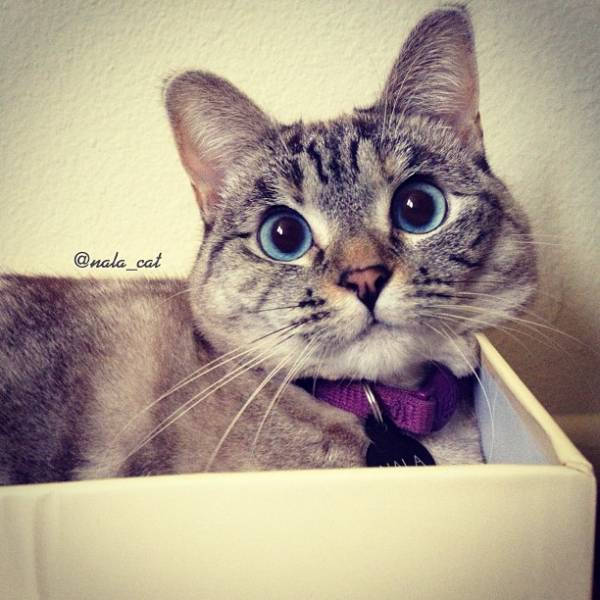
Of course, this version is quite controversial, but the official science quite agree with their "colleagues". It is unknown why and how the cat determines where its master is in pain, but it really begins to do its "massage" exactly on this place. As a result, local skin irritation is caused, and blood comes to this area intensively. In short, the mechanism of this action is almost similar to that of a professional massage.
"Endorphin addicts".
Strange as it may seem, but during stomping the cat's body produces a large amount of endorphin. This hormone promotes a relaxed, complacent state and is a natural stress reliever. Simply put, the animal in this simple way calms down, leads himself to normal. You have probably seen more than once that the cat, being almost asleep, continues to automatically "trample" on the sofa or the cushion.
If it is still awake, it often licks, paying special attention to the same pads on its paws. In this way the animal produces an increased stimulation of the production
of endorphin. Have you ever noticed how after such a toilet your pet goes for a sweet nap? In general, Mother Nature has given these miniature carnivores a built-in stress reliever. It wouldn't do a man any harm to have such a mechanism!






